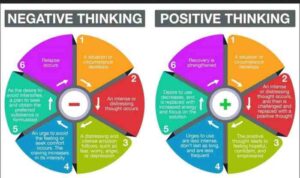Positive Thinking Tips – the key to unlocking your full potential and achieving success. Dive into a world of strategies and daily habits that will supercharge your positivity and motivation like never before.
Learn how to overcome negative thinking patterns and cultivate a mindset that fosters growth and resilience. Get ready to revolutionize your outlook on life with these powerful tips.
Benefits of Positive Thinking
Maintaining a positive mindset is crucial for overall well-being and success in life. Positive thinking can help improve mental health, increase motivation, and boost productivity. It allows individuals to approach challenges with a can-do attitude, leading to better problem-solving skills and resilience.
Improved Mental Health
Positive thinking has been linked to reduced stress levels, lower rates of depression and anxiety, and overall better mental health. By focusing on the good in every situation, individuals can train their brains to see the silver lining even in difficult times.
Increased Motivation and Productivity
When individuals have a positive outlook on life, they are more likely to set goals, take action, and work towards achieving their dreams. Positive thinking fuels motivation and drives individuals to be more productive in their personal and professional lives.
Enhanced Relationships
Positive thinking can also have a positive impact on relationships. By radiating positivity, individuals attract like-minded people and build stronger connections with others. This can lead to a more fulfilling social life and a support system that uplifts and encourages.
Strategies for Cultivating Positive Thinking

Positive thinking can be cultivated through various techniques and practices. By shifting negative thoughts to positive ones, practicing gratitude, and surrounding oneself with positive influences, individuals can enhance their overall mindset and well-being.
Shifting Negative Thoughts to Positive Ones
One effective technique for cultivating positive thinking is to challenge and reframe negative thoughts. When a negative thought arises, take a moment to question its validity and replace it with a more positive and realistic perspective. This practice can help rewire the brain to focus on the good rather than the bad.
Practicing Gratitude to Promote Positive Thinking
Practicing gratitude involves acknowledging and appreciating the good things in life, no matter how small. By keeping a gratitude journal, regularly reflecting on positive experiences, or simply saying “thank you” more often, individuals can shift their focus from what is lacking to what is abundant, fostering a positive mindset.
Surrounding Oneself with Positive Influences
The people we surround ourselves with can greatly influence our thoughts and emotions. By choosing to spend time with positive, supportive, and uplifting individuals, we can absorb their energy and outlook on life. Whether it’s friends, family, or mentors, surrounding oneself with positivity can create a nurturing environment for cultivating positive thinking.
Daily Habits to Foster Positive Thinking
Maintaining a positive outlook requires consistent effort and dedication. By incorporating certain daily habits into your routine, you can cultivate a mindset that fosters positivity and resilience.
Mindfulness Practices
- Start your day with a few minutes of meditation or deep breathing exercises to center yourself and set a positive tone for the day.
- Practice gratitude by keeping a journal and writing down things you are thankful for each day.
- Stay present in the moment by focusing on your senses and the beauty of your surroundings.
Self-Care
- Make time for activities that bring you joy and relaxation, such as reading a book, taking a walk in nature, or enjoying a hobby.
- Set boundaries and prioritize your well-being by saying no to things that drain your energy or cause unnecessary stress.
- Get an adequate amount of sleep each night to ensure your body and mind are well-rested and ready to face the day.
Overcoming Negative Thinking Patterns: Positive Thinking Tips

Negative thinking patterns can have a significant impact on our mental well-being, but there are strategies to challenge and overcome them. By recognizing common negative thinking patterns and implementing techniques to reframe them in a positive light, we can build resilience and combat negative thoughts effectively.
Identifying Common Negative Thinking Patterns
Before we can challenge negative thinking patterns, it’s important to identify them. Common patterns include:
- Black and white thinking: Seeing situations as all good or all bad, without considering the nuances.
- Overgeneralization: Drawing broad conclusions based on a single negative event.
- Catastrophizing: Assuming the worst possible outcome will always happen.
Challenging Negative Thoughts
Once we’ve identified negative thinking patterns, we can challenge them by:
- Recognizing when negative thoughts arise and questioning their validity.
- Considering alternative perspectives or explanations for a situation.
- Practicing self-compassion and acknowledging that it’s okay to make mistakes.
Building Resilience, Positive Thinking Tips
Building resilience is essential in combating negative thoughts effectively. Here are some tips to help you build resilience:
- Practice mindfulness: Stay present and focused on the here and now.
- Engage in self-care activities: Prioritize activities that nourish your mind, body, and soul.
- Seek support: Reach out to friends, family, or a therapist for help when needed.




